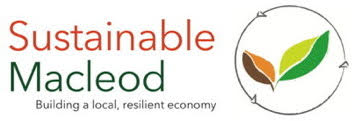Banyule 2041 – Shaping Our Future

Sustainable Macleod’s vision for Banyule in 2041 is of a city which is an inclusive, connected community where all people feel valued and respected, a city that respects and enhances the environment and one which has achieved zero carbon emissions at Council, business and domestic levels. In line with our motto, we see the city of Banyule presiding over a strong, local, resilient economy, and a self-sufficient city where people can meet all their living needs.
We are aware that Banyule City Council cannot ‘achieve’ all that we would like itself but we would hope that it would foster the themes important to us as outlined below.
We contend that an inclusive, connected community is a safe place to live, an exciting and inspirational place to live and a healthy place to live. This is particularly significant in light of the current pandemic, and the possibility that there will be more pandemics. Our vision for Banyule is for it to be a self-sufficient community offering residents all they need to live well in good times and difficult times.
It is our vision that focusing on the mental health and well being of the community should be a priority and will include a deeper integration of all ages, family structures, ethnicities, sexual orientations and gender identities. In particular we see Banyule City Council fostering the development of public and private social housing that is intergenerational, consisting of families of all types. Our vision includes alternatives to age care for older people and a huge reduction in separate institutional living for this group.
High on our agenda is an end to homelessness in Banyule and support for people who find themselves without accommodation. We do not see this as only the role of charities or DHHS. We believe that Council can, and should, foster a new approach to this issue in Banyule.
We also see the fostering of opportunities for young people in Banyule in education, work and culture as a high priority. These opportunities need to be so well integrated and so obviously available that young people feel themselves to be important in our community. Our community will be a place in which they aspire to continue living.
In relation to the environment, we envision a Banyule that has many more green belt offsets, increased and enhanced parks, reserves, bike paths and walking tracks, clean waterways, with the restoration of waterways such as Salt Creek as flowing creeks, continuous biodiversity corridors to protect and enhance bird and animal life and flora, the allocation of unused and waste land for neighbourhood and community gardening and the reforestation of Banyule.
The reforestation of Banyule is a very high priority for us. We accept, though we don’t necessarily like, Banyule’s policy of dual dwellings, recognising that it makes best use of existing infrastructure and slows the encroachment on Melbourne’s peri-agricultural land. However, construction of extra dwellings behind existing dwellings or demolition of existing dwellings to make way for apartments is resulting in removal of soil, vegetation and large trees, and replacement with vast tracts of concrete and asphalt in the form of driveways, paths and landscaped areas. This in turn is leading to a rise in the heat island effect and increasing temperatures across Banyule. Council should immediately begin a programme of providing shade trees throughout all streets in Banyule to offset this unwelcome outcome.
In relation to climate change, we see Banyule as a model for other cities, achieving zero carbon emissions for Council, business and industry, and domestically. Reaching zero emissions is a big, but not insurmountable, challenge requiring strong policy, promotion and education of all sectors of the community. It will require support for solar installation and batteries, support and incentives for the purchase of electric cars (for example through bulk buys). The Banyule of 2041 will be one where Council has introduced a fleet of small electric buses attached to single suburbs to move people back and forth from shops and stations.This could be achieved using Council-owned buses, or by supporting private operators. Such a scheme would reduce dependence on cars, encourage use of public transport and support local shopping strips.
We envision Council continuing and expanding support for local shops as these form the heart of our local communities.
Our vision includes waste management. We support FOGO* and also see as crucial, education and incentives for residents to take on the responsibility of composting their own food waste which will in turn reduce pressure on Council waste services. An additional benefit will be the improvement in soil quality and retention of moisture in soil. Our vision would also be for Council to supply green waste and wood chips free to residents. Recycling will be extended to include a much wider range of materials including polystyrene and soft plastics.
We see Council continuing to support local groups in their role of building a resilient, inclusive and self-sufficient community.
* Food Organics and Garden Organics
by Robin Gale-Baker and Paul Gale-Baker on behalf of Sustainable Macleod Inc.
